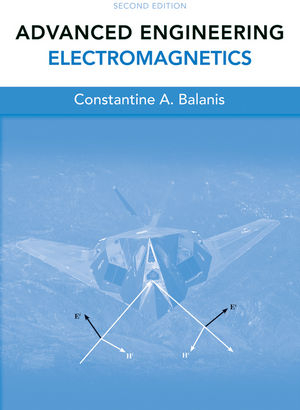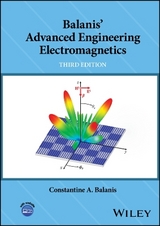
Advanced Engineering Electromagnetics
John Wiley & Sons Inc (Verlag)
978-0-470-58948-9 (ISBN)
- Titel erscheint in neuer Auflage
- Artikel merken
Balanis’ second edition of Advanced Engineering Electromagnetics – a global best-seller for over 20 years – covers the advanced knowledge engineers involved in electromagnetic need to know, particularly as the topic relates to the fast-moving, continually evolving, and rapidly expanding field of wireless communications. The immense interest in wireless communications and the expected increase in wireless communications systems projects (antenna, microwave and wireless communication) points to an increase in the number of engineers needed to specialize in this field. In addition, the Instructor Book Companion Site contains a rich collection of multimedia resources for use with this text. Resources include:
Ready-made lecture notes in Power Point format for all the chapters.
Forty-nine MATLAB® programs to compute, plot and animate some of the wave phenomena
Nearly 600 end-of-chapter problems, that's an average of 40 problems per chapter (200 new problems; 50% more than in the first edition)
A thoroughly updated Solutions Manual
2500 slides for Instructors are included.
Constantine A. Balanis (born 1938) is a Greek born American scientist. Born in Trikala, Greece on October 29, 1938. He emigrated to the United States in 1955, where he studied Electrical Engineering. He received United States citizenship in 1960. Balanis received the Bachelor of Science degree from Virginia Polytechnic Institute and State University, in 1964, the Master of Science degree from the University of Virginia, in 1966, and the Doctor of Philosophy degree in Electrical Engineering from Ohio State University, in 1969, and an Honorary Doctorate from the Aristotle University of Thessaloniki in 2004. From 1964 to 1970 he was with the National Aeronautics and Space Administration (NASA) Langley Research Center in Hampton, Virginia and from 1970 to 1983 he was with the Department of Electrical Engineering, West Virginia University, Morgantown, WV.
Preface xvii 1 Time-Varying and Time-Harmonic Electromagnetic Fields 1
1.1 Introduction 1
1.2 Maxwell's Equations 1
1.3 Constitutive Parameters and Relations 5
1.4 Circuit-Field Relations 7
1.5 Boundary Conditions 12
1.6 Power and Energy 18
1.7 Time-Harmonic Electromagnetic Fields 21
1.8 Multimedia 29
2 Electrical Properties of Matter 39
2.1 Introduction 39
2.2 Dielectrics, Polarization, and Permittivity 41
2.3 Magnetics, Magnetization, and Permeability 48
2.4 Current, Conductors, and Conductivity 55
2.5 Semiconductors 59
2.6 Superconductors 64
2.7 Matamaterials 66
2.8 Linear, Homogeneous, Isotropic, and Nondispersive Media 67
2.9 A.C. Variations in Materials 68
2.10 Multimedia 89
3 Wave Equation and its Solutions 99
3.1 Introduction 99
3.2 Time-Varying Electromagnetic Fields 99
3.3 Time-Harmonic Electromagnetic Fields 101
3.4 Solution to the Wave Equation 102
4 Wave Propagation and Polarization 123
4.1 Introduction 123
4.2 Transverse Electromagnetic Modes 123
4.3 Transverse Electromagnetic Modes in Lossy Media 138
4.4 Polarization 146
4.5 Multimedia 166
5 Reflection and Transmission 173
5.1 Introduction 173
5.2 Normal Incidence—Lossless Media 173
5.3 Oblique Incidence—Lossless Media 177
5.4 Lossy Media 198
5.5 Reflection and Transmission of Multiple Interfaces 205
5.6 Polarization Characteristics on Reflection 220
5.7 Metamaterials 227
5.8 Multimedia 245
6 Auxiliary Vector Potentials, Construction of Solutions, and Radiation and Scattering Equations 259
6.1 Introduction 259
6.2 The Vector Potential A 260
6.3 The Vector Potential F 262
6.4 The Vector Potentials A and F 263
6.5 Construction of Solutions 265
6.6 Solution of the Inhomogeneous Vector Potential Wave Equation 279
6.7 Far-Field Radiation 283
6.8 Radiation and Scattering Equations 284
6.9 Multimedia 305
7 Electromagnetic Theorems and Principles 311
7.1 Introduction 311
7.2 Duality Theorem 311
7.3 Uniqueness Theorem 313
7.4 Image Theory 315
7.5 Reciprocity Theorem 323
7.6 Reaction Theorem 325
7.7 Volume Equivalence Theorem 326
7.8 Surface Equivalence Theorem: Huygens'S Principle 328
7.9 Induction Theorem (Induction Equivalent) 333
7.10 Physical Equivalent and Physical Optics Equivalent 337
7.11 Induction and Physical Equivalent Approximations 339
7.12 Multimedia 344
8 Rectangular Cross-Section Waveguides and Cavities 351
8.1 Introduction 351
8.2 Rectangular Waveguide 352
8.3 Rectangular Resonant Cavities 382
8.4 Hybrid (LSE and LSM) Modes 390
8.5 Partially Filled Waveguide 393
8.6 Transverse Resonance Method 405
8.7 Dielectric Waveguide 408
8.8 Artificial Impedance Surfaces 436
8.9 Stripline and Microstrip Lines 455
8.10 Ridged Waveguide 466
8.11 Multimedia 470
9 Circular Cross-Section Waveguides and Cavities 483
9.1 Introduction 483
9.2 Circular Waveguide 483
9.3 Circular Cavity 500
9.4 Radial Waveguides 509
9.5 Dielectric Waveguides and Resonators 516
9.6 Multimedia 541
10 Spherical Transmission Lines and Cavities 549
10.1 Introduction 549
10.2 Construction of Solutions 549
10.3 Biconical Transmission Line 557
10.4 The Spherical Cavity 561
10.5 Multimedia 569
11 Scattering 575
11.1 Introduction 575
11.2 Infinite Line-Source Cylindrical Wave Radiation 575
11.3 Plane Wave Scattering by Planar Surfaces 583
11.4 Cylindrical Wave Transformations and Theorems 599
11.5 Scattering by Circular Cylinders 607
11.6 Scattering By a Conducting Wedge 640
11.7 Spherical Wave Orthogonalities, Transformations, and Theorems 650
11.8 Scattering by a Sphere 655
11.9 Multimedia 665
12 Integral Equations and the Moment Method 679
12.1 Introduction 679
12.2 Integral Equation Method 679
12.3 Electric and Magnetic Field Integral Equations 703
12.4 Finite Diameter Wires 723
12.5 Computer Codes 732
12.6 Multimedia 735
13 Geometrical Theory of Diffraction 741
13.1 Introduction 741
13.2 Geometrical Optics 742
13.3 Geometrical Theory of Diffraction: Edge Diffraction 761
13.4 Computer Codes 829
13.5 Multimedia 831
14 Diffraction by Wedge with Impedance Surfaces 849
14.1 Introduction 849
14.2 Impedance Surface Boundary Conditions 850
14.3 Impedance Surface Reflection Coefficients 851
14.4 The Maliuzhinets Impedance Wedge Solution 854
14.5 Geometrical Optics 856
14.6 Surface Wave Terms 864
14.7 Diffracted Fields 867
14.8 Surface Wave Transition Field 874
14.9 Computations 875
14.10 Multimedia 878
15 Green's Functions 885
15.1 Introduction 885
15.2 Green's Functions in Engineering 886
15.3 Sturm–Liouville Problems 891
15.4 Two-Dimensional Green's Function in Rectangular Coordinates 908
15.5 Green's Identities and Methods 919
15.6 Green's Functions of the Scalar Helmholtz Equation 925
15.7 Dyadic Green's Functions 938
15.8 Multimedia 941
References 941
Problems 942
Appendix I: Identities 947
Appendix II: Vector Analysis 951
Appendix III: Fresnel Integrals 961
Appendix IV: Bessel Functions 967
Appendix V: Legendre Polynomials and Functions 981
Appendix VI: The Method of Steepest Descent (Saddle-Point Method) 997
Index 1003
| Erscheint lt. Verlag | 20.2.2012 |
|---|---|
| Verlagsort | New York |
| Sprache | englisch |
| Maße | 191 x 261 mm |
| Gewicht | 1704 g |
| Themenwelt | Technik ► Elektrotechnik / Energietechnik |
| ISBN-10 | 0-470-58948-5 / 0470589485 |
| ISBN-13 | 978-0-470-58948-9 / 9780470589489 |
| Zustand | Neuware |
| Informationen gemäß Produktsicherheitsverordnung (GPSR) | |
| Haben Sie eine Frage zum Produkt? |
aus dem Bereich



